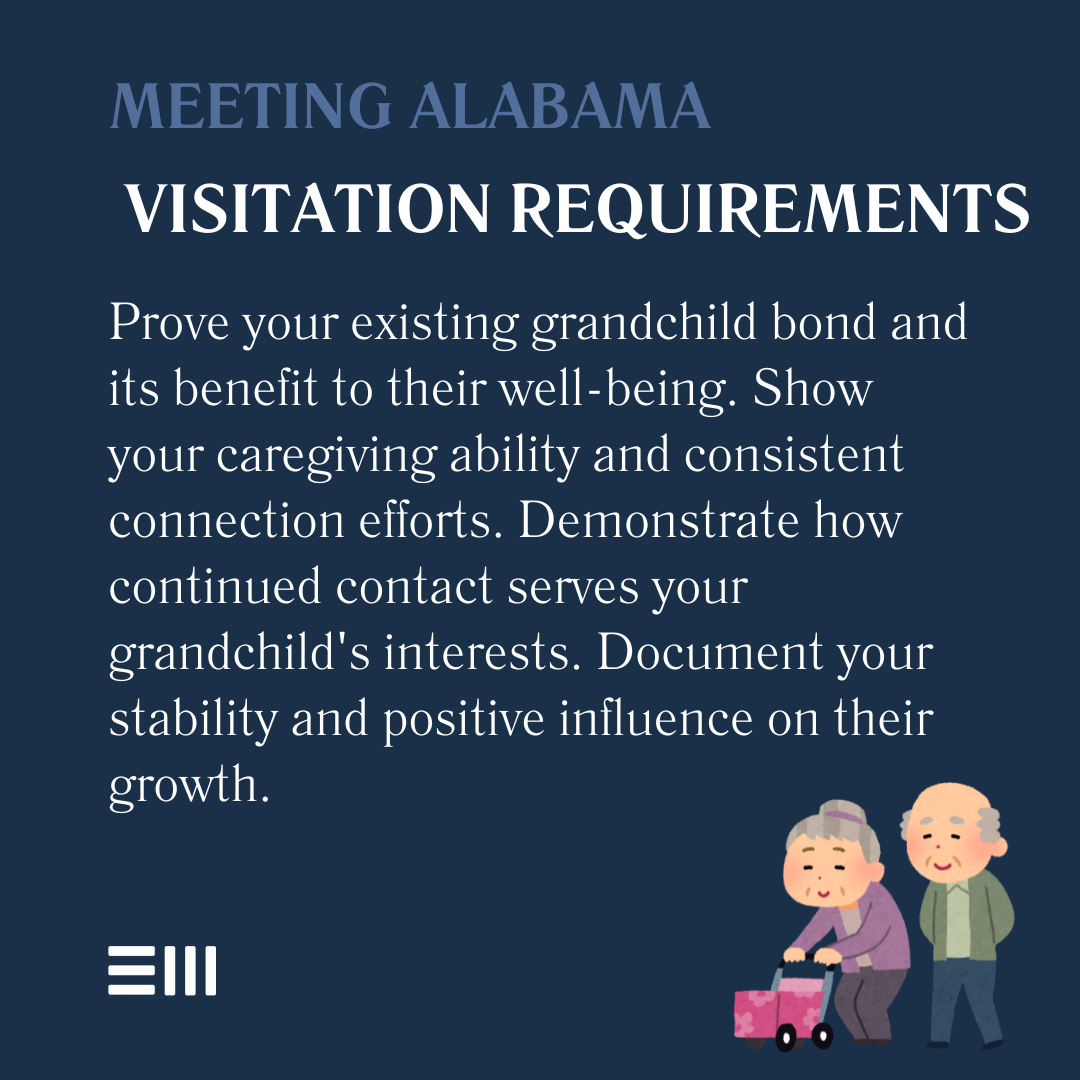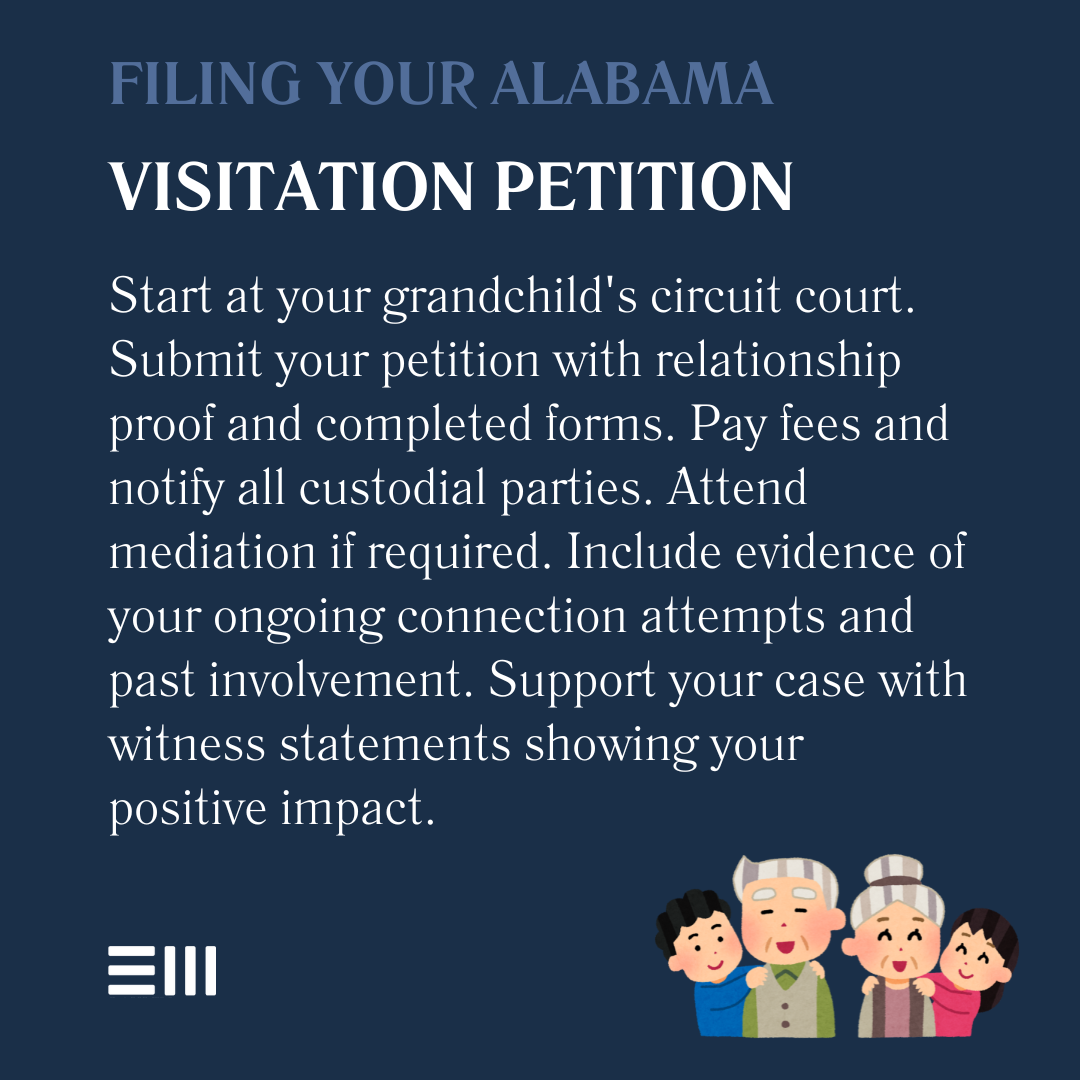The Sunday afternoon visits filled with warm cookies and family stories have suddenly stopped. The cherished moments of teaching grandchildren to fish in the backyard pond or sharing secret family recipes have been abruptly cut off.
For countless Alabama grandparents, the heart-wrenching reality of being separated from their grandchildren has become an unexpected chapter in their family story.
While parents' rights are clearly defined in Alabama law, many grandparents find themselves navigating uncertain legal waters when seeking to maintain relationships with their grandchildren.
Understanding Grandparents' Rights in Alabama
In Alabama, grandparents' rights have evolved significantly through both legislation and court decisions.
The Alabama Grandparent Visitation Act provides specific pathways for grandparents to maintain meaningful relationships with their grandchildren while respecting parental rights.
Legal Requirements for Visitation Rights
Before pursuing legal action for visitation rights, grandparents must meet certain criteria:
- Proof of a pre-existing relationship with the grandchild;
- Evidence that denying visitation would harm the child's well-being;
- Demonstration of the grandparent's fitness and capability;
- Documentation of attempts to maintain contact with the grandchild;
- Evidence that visitation serves the child's best interests;
- Proof of financial stability and ability to provide care;
- Documentation of any previous caregiving responsibilities; and
- Evidence of positive impact on the child's development.
Meeting these requirements establishes a strong foundation for your legal case and demonstrates your commitment to your grandchild's welfare.
Filing a Petition for Grandparent Visitation
The process of filing for visitation rights involves several key steps:
- Submit a petition in the circuit court where the grandchild resides;
- Provide detailed documentation of your relationship with the grandchild;
- Complete all required court forms and pay filing fees;
- Serve notice to all parties with custodial rights;
- Attend mandatory mediation sessions if required by the court;
- Prepare witness statements and character references;
- Gather evidence of previous involvement in the child's life; and
- Document any financial support provided to the child.
Understanding and properly executing these requirements significantly improves your chances of securing visitation rights.
Common Scenarios and Legal Solutions
Each family situation presents unique challenges when it comes to grandparents' rights.
Here are common scenarios and their potential legal solutions:
When Parents Divorce
- Right to petition for visitation during divorce proceedings;
- Ability to intervene in custody arrangements;
- Options for maintaining contact during transition periods;
- Possibilities for structured visitation schedules;
- Rights to participate in family court mediation;
- Opportunities to provide testimony about the child's needs;
- Options for emergency temporary custody; and
- Rights to request modification of existing arrangements.
During divorce proceedings, courts often recognize grandparents as stabilizing influences who can help children adjust to family changes.
After the Death of a Parent
- Enhanced rights when a biological parent is deceased;
- Special considerations for maintaining family connections;
- Procedures for establishing formal visitation schedules;
- Options for securing legal guardianship if necessary;
- Rights to continue family traditions and cultural practices;
- Ability to maintain relationships with extended family;
- Provisions for holiday and special occasion visits; and
- Rights to participate in educational decisions.
These situations often create stronger legal grounds for grandparent involvement, particularly when maintaining connections to the deceased parent's family.
During Parent Incarceration
- Temporary custody arrangements;
- Visitation rights during incarceration;
- Communication maintenance procedures;
- Legal guardianship possibilities;
- Rights to make educational decisions;
- Authority for medical care;
- Financial support arrangements; and
- Access to social services and support programs.
The Alabama court system recognizes the vital role grandparents play in providing stability during parental incarceration.
Important Questions About Grandparents' Rights in Alabama
Understanding your legal options starts with knowing the answers to common questions about grandparents' rights in Alabama.
What Are the Legal Standards for Grandparent Visitation in Alabama?
Courts evaluate several factors when considering grandparent visitation:
- The pre-existing relationship between grandparent and grandchild;
- The child's best interests and emotional well-being;
- The impact on the parent-child relationship;
- The grandparent's ability to provide a stable environment;
- The child's preference (if age-appropriate);
- The physical and emotional health of all parties;
- The geographic proximity of the grandparent's residence; and
- The ability to maintain consistent visitation schedules.
These standards help ensure that visitation arrangements serve the child's best interests while respecting family relationships.
How Does Alabama Define Harm in Grandparent Visitation Cases?
Alabama courts consider various forms of potential harm:
- Loss of significant emotional bonds;
- Disruption of established relationships;
- Impact on the child's emotional development;
- Effects on family stability and support systems;
- Loss of cultural connections and heritage;
- Reduction in extended family support;
- Impact on the child's sense of identity; and
- Disruption of established routines and traditions.
Understanding these definitions helps build stronger cases for maintaining grandparent-grandchild relationships.
What Evidence Do Grandparents Need to Present in Court?
Successful petitions typically include:
- Documentation of previous involvement in the child's life;
- Records of attempted communication;
- Character references and testimony;
- Evidence of ability to provide appropriate care;
- Financial stability documentation if relevant;
- Medical records demonstrating fitness to care for children;
- Proof of safe and appropriate housing; and
- Documentation of any special skills or training relevant to childcare.
Comprehensive documentation strengthens your legal position and demonstrates your commitment to your grandchild's well-being.
Steps Toward Securing Your Rights
Take action today to protect your relationship with your grandchildren. Our experienced family law attorneys understand the complexities of grandparents' rights cases in Alabama and can help you navigate the legal system effectively.
Contact us for a confidential consultation to:
- Evaluate your legal options;
- Develop a strategic approach;
- Understand the costs involved;
- Begin the petition process;
- Protect your grandchildren's interests;
- Create a comprehensive visitation plan;
- Address immediate concerns; and
- Plan for long-term success.
Schedule your consultation and take the first step toward securing your rights as a grandparent in Alabama.


